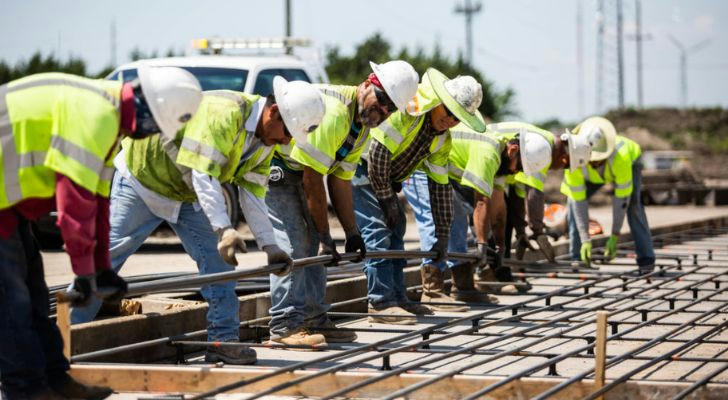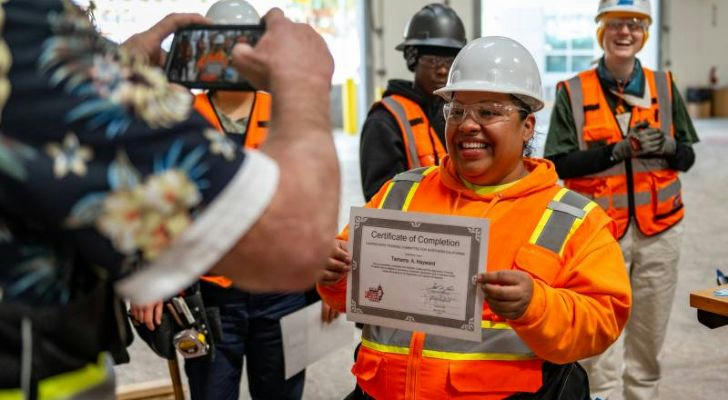Why Choose the Construction Industry? Five Reasons to Fall in Love with This Career
Introduction
The construction industry is crucial for creating and maintaining the buildings and infrastructure that shape our world. With urbanization accelerating and infrastructure needs expanding, the field offers not only stable employment but also drives economic development. From residential to commercial and public projects, construction workers play a pivotal role in shaping our environment.

Stable Employment Prospects
Market Demand:
The construction industry benefits from growing demand driven by urbanization, aging infrastructure, and economic expansion. Globally, there is a consistent need for new residential, commercial, and infrastructure projects, which supports high demand for construction workers.
Growth Trends:
Smart and Green Buildings: Advances in technology and environmental consciousness are driving demand for smart and green buildings, increasing the need for specialized skills.
Infrastructure Upgrades: Ongoing repairs and upgrades to outdated infrastructure provide numerous opportunities for construction workers.
Urbanization and Population Growth: Rapid urbanization and rising populations, particularly in developing countries, fuel further construction needs.
Long-Term Job Stability and Safety
Job Stability:
Construction typically offers stable employment due to the long-term nature of projects and the persistent need for construction across economic cycles. Additionally, a shortage of skilled workers enhances job security in the industry.
Safety:
Advancements in technology and safety standards have significantly improved safety on construction sites. Modern companies prioritize worker safety with comprehensive training and protective measures, making the work environment safer despite inherent risks.
Diverse Career Opportunities
The construction industry offers a wide range of positions, from entry-level roles to advanced management:
Laborers: Handle material transport and perform basic tasks such as digging and concrete pouring.
Electricians: Install and maintain electrical systems.
Plumbers: Manage plumbing systems, including water supply and drainage.
Carpenters: Work on wooden structures, such as framing and installation.
Bricklayers: Construct brick and stone walls.
Concrete Workers: Focus on concrete pouring and finishing.
Site Managers: Oversee site activities and manage teams.
Architects: Design building plans, balancing functionality and aesthetics.
Building Inspectors: Ensure construction quality and compliance with safety standards.
Environmental Engineers: Promote green building practices and ensure compliance with environmental regulations.

Applications Across Multiple Fields
Construction skills are applicable in various sectors:
Residential Construction: From single-family homes to large communities, involving roles like laborers, carpenters, and electricians.
Commercial Construction: Includes offices, malls, and hotels, requiring designers, plumbers, and concrete workers.
Infrastructure Development: Encompasses projects like bridges and roads, requiring specialized skills such as site managers and inspectors.
Public Works: Includes schools and hospitals, covering all phases from planning to completion.
Renovation and Maintenance: Involves upgrading and maintaining existing buildings, applying diverse construction skills for quality and safety.
Competitive Salaries and Benefits
Competitive Salary Levels
Salaries in the construction industry vary by position, region, experience, and skills:
Stable Salary Growth: Higher salaries are typical for specialized roles and advanced positions, such as site managers or project managers.
Industry Standard Salaries: Generally, construction salaries are above average compared to some other sectors, especially in high-demand areas.
Skill Premium: Specific certifications (e.g., electrician or welding) often result in higher pay.
Additional Benefits and Allowances
Construction roles often come with various benefits:
Health Insurance: Comprehensive coverage including medical, dental, and vision.
Retirement Plans: Options like 401(k) plans to help with future savings.
Overtime Pay: Additional pay for hours beyond standard work schedules.
Tool and Equipment Allowances: Some companies provide or subsidize necessary tools.
Training and Career Development: Opportunities for further education and certifications.
Safety Allowances: Extra compensation on high-risk sites to offset additional safety risks.
Career Development and Growth Opportunities
Skill Training
Training in the construction industry enhances professional skills and safety:
Basic Skills Training: Covers foundational construction knowledge and tool usage. Consider enrolling in local community college programs or trade schools.
Specialized Skills Training: Focuses on specific trades like electrical work or plumbing. Look for apprenticeships or specialized courses offered by industry associations.
Safety Training: Emphasizes site safety and accident prevention. Obtain certifications such as OSHA for comprehensive safety knowledge.
Technical Training: Includes new technologies and green building standards. Participate in workshops or online courses to stay current with industry advancements.
Certifications
Certifications validate professional capabilities and can enhance career prospects:
Professional Certifications: Includes electrician and plumbing certificates, typically offered by industry-recognized organizations. Research certification requirements and prepare for exams through study guides or preparatory courses.
Safety Certifications: Such as OSHA certification, which is essential for demonstrating safety expertise. Enroll in OSHA training programs to earn these credentials.
Technical Certifications: Includes BIM and LEED certifications for advanced technologies and sustainable practices. Pursue these certifications through specialized training providers to gain expertise in emerging fields.
Promotion and Development Paths
Promotion Path
Typical career advancement includes:
Entry-Level Worker: Begins as a laborer or apprentice. Gain experience and seek mentorship to develop foundational skills.
Technical Worker: Develops specialized skills in a trade. Take on more complex tasks and pursue additional training to advance.
Senior Technical Worker: Takes on complex tasks or projects. Demonstrate leadership and project management skills to move up to managerial roles.
Site Manager: Manages site activities and teams. Enhance your management skills through leadership courses and on-the-job experience.
Project Manager: Oversees project execution and client communication. Obtain project management certifications and seek opportunities to lead larger projects.
Executive Management: Includes roles like regional manager or operations director. Gain experience in various aspects of construction management and pursue advanced education in business or management.
Development Opportunities
Career growth opportunities include:
Skill Enhancement: Through further education and training. Continuously seek out new learning opportunities to stay competitive.
Cross-Field Development: Transition between different construction fields. Explore roles in residential, commercial, and infrastructure projects to broaden your expertise.
Internal Company Development: Advance within a company based on performance. Take on additional responsibilities and seek promotions to grow within your organization.
Entrepreneurial Opportunities: Start a construction business or consultancy. Leverage industry experience to launch your own ventures and explore new business opportunities.
Practical Solutions for Career Development
- How to Enhance Skills:
Enroll in Local Programs: Look for community colleges or vocational schools offering construction-related courses.
Seek Apprenticeships: Gain hands-on experience and learn from seasoned professionals.
Attend Workshops: Participate in industry workshops to learn about the latest techniques and technologies.
- How to Obtain Certifications:
Research Requirements: Identify the certifications relevant to your career goals and understand the prerequisites.
Prepare for Exams: Use study guides and preparatory courses to prepare for certification exams.
Enroll in Training Programs: Join accredited training programs that offer certification preparation and testing.
- How to Find Job Opportunities:
Network: Join industry associations and attend industry events to connect with potential employers.
Utilize Job Boards: Regularly check job boards and company websites for openings in your area of interest.
Contact Recruitment Agencies: Work with agencies specializing in construction jobs to find opportunities that match your skills and interests.
Real-Life Construction Worker Example: Jack Smith's Success Story
Jack Smith’s career demonstrates the construction industry’s potential. Starting as a laborer, he advanced to become a site manager through hard work and continuous learning. Earning certifications in electrical work and plumbing, Jack took on advanced roles and eventually managed large projects. His story illustrates the industry's growth potential and diverse opportunities, inspiring many to consider a career in construction.

Conclusion
The construction industry offers stability, competitive salaries, diverse career opportunities, and significant growth potential. With its broad range of roles, strong demand, and robust career development paths, it is a career full of potential and rewards. For those seeking stability, financial benefits, and the chance to contribute to meaningful projects, the construction industry presents an ideal choice. Consider exploring this dynamic field, enhancing your skills, obtaining certifications, and seizing career development opportunities to achieve your professional aspirations and long-term success.
